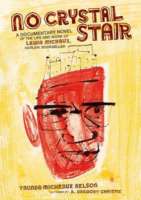by Ann Parker, Pima Community College, Tucson, Arizona
 Today’s post is a continuation of the presentation with Jerry Pinkney, Jacqueline Woodson, and Vaunda M. Nelson that I attended on March 10, 2013 at the Tucson Festival of Books. The presentation was entitled “The Choice to Make a Difference”. This week, Vaunda M. Nelson describes the writing of her book No Crystal Stair.
Today’s post is a continuation of the presentation with Jerry Pinkney, Jacqueline Woodson, and Vaunda M. Nelson that I attended on March 10, 2013 at the Tucson Festival of Books. The presentation was entitled “The Choice to Make a Difference”. This week, Vaunda M. Nelson describes the writing of her book No Crystal Stair.
Vaunda Micheaux Nelson is the author of several books for children, including Bad News for Outlaws: The Remarkable Life of Bass Reeves, which won the 2010 Coretta Scott King Author Award and the Gelett Burgess Children’s Book Award (given for family-friendly books) and the 2013 Coretta Scott King Author Honor Book No Crystal Stair: A Documentary Novel of the Life and Work of Lewis Michaux, Harlem Bookseller.
Vaunda: No Crystal Stair was a journey for me, a 15-year labor of love. I love history and this book is family history. It’s about my great uncle [Lewis Michaux], who opened a black bookstore in Harlem in the 1930s. The store stayed open until the mid 1970’s and it really thrived during the Civil Rights Era. It became a gathering place for many of the major black leaders of the time.
Growing up I knew about the bookstore, but my family lived in Pennsylvania and we weren’t very mobile. We would drive to New York in the summer to visit my grandparents in Westchester County. We kids spent most of our time at Rye Beach and hanging out at my grandparents’ house in Port Chester. The bookstore wasn’t a place we went much.
Years later, when I was in library school, people would ask if I was related to “that bookseller in Harlem”. The more people asked, the more I realized something important had happened there and I wasn’t in the loop. That’s when I started researching the family. Sometimes I was frustrated, hitting brick walls, finding little or no information. Other times I’d uncover something surprising and really wonderful.
My uncle had a rocky boyhood. He was very much finding his way, and he got involved in criminal activity. In these early years, Lewis was not someone who had made a choice to make a difference, but he grew over time. It was this journey that intrigued me.
I’m a librarian, so naturally another thing that drew me to his story was the book connection. My uncle was saved by books, by reading, and he went on to save other African Americans through his store. Lewis stressed the importance of knowing our history, knowing where we came from. He believed that if African Americans read and educated themselves, they would grow, they could progress. So he opened The National Memorial African Bookstore and became a mentor for people, young and old.
I began writing this book as straight biography but, in those early drafts, I hadn’t brought my characters to life. I knew there were details missing that I wasn’t going to be able to find because so many people in the family or who knew Lewis had passed away. I wish I had asked my dad more . . . my grandparents. I encourage young people to talk with their families and record their history while those who know the stories are still alive.
I wasn’t sure how to move forward with the story until I read two wonderful books: Nikki Grimes’s Talkin’ About Bessie [aviator Elizabeth Coleman] and Marilyn Nelson’s Carver: A Life in Poems [George Washington Carver]. Both books deal with important people, and tell their stories through poetry in the voices of the people who surrounded them. I loved those books and thought of doing something similar.
I began creating voices based on my research of Lewis – his parents, his siblings, people who came to the bookstore. Transcripts of interviews with my uncle enabled me to capture his voice. Audio tapes of Lewis speaking gave me an understanding of his attitudes. I also interviewed people who knew my uncle and included their stories. I was presenting at a Baptist church in New Mexico and the minister stood up and said, ‘I was in that bookstore. I knew your uncle.’ Rev. Becknell gave me some wonderful material for No Crystal Stair. [The poet] Nikki Giovanni knew my uncle and told me some marvelous stories which I adapted for the book. So the finished book is a hybrid of fictionalized voices based on real people, a couple of characters that I created, and documents like F.B.I files and newspaper articles. My husband began calling it Documentary Fiction.
When I finished reading Carver, I felt I really knew something of the man’s spirit. That’s what I hope readers will experience with No Crystal Stair.
Please visit wowlit.org to browse or search our growing database of books, to read one of our two on-line journals, or to learn more about our mission.
- Themes: Ann Parker, Choice to Make a Difference, Jacqueline Woodson, Jerry Pinkney, Vaunda M. Nelson
- Descriptors: Interviews & Profiles, WOW Currents
